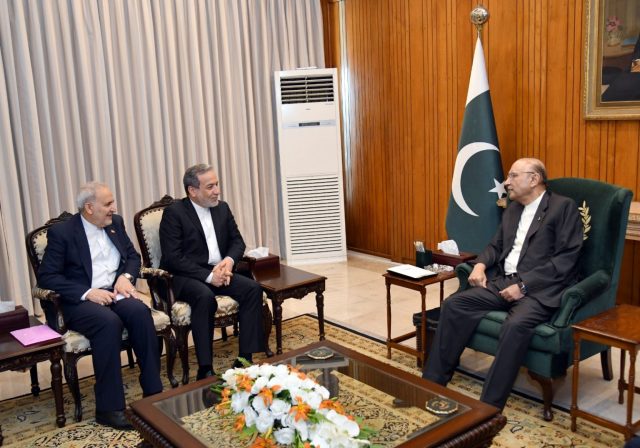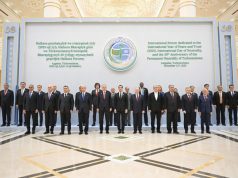ISLAMABAD, Monday, May 5, 2025 (WNP): Iranian Foreign Minister Seyed Abbas Araghchi arrived in Islamabad late Sunday on a one-day official visit, during which he held wide-ranging talks with Pakistan’s top civil and political leadership on regional security, bilateral relations, and efforts to defuse tensions in South Asia.
Araghchi was received at the airport by Additional Secretary for West Asia Syed Asad Gillani, the Iranian Ambassador to Pakistan, and other senior officials.
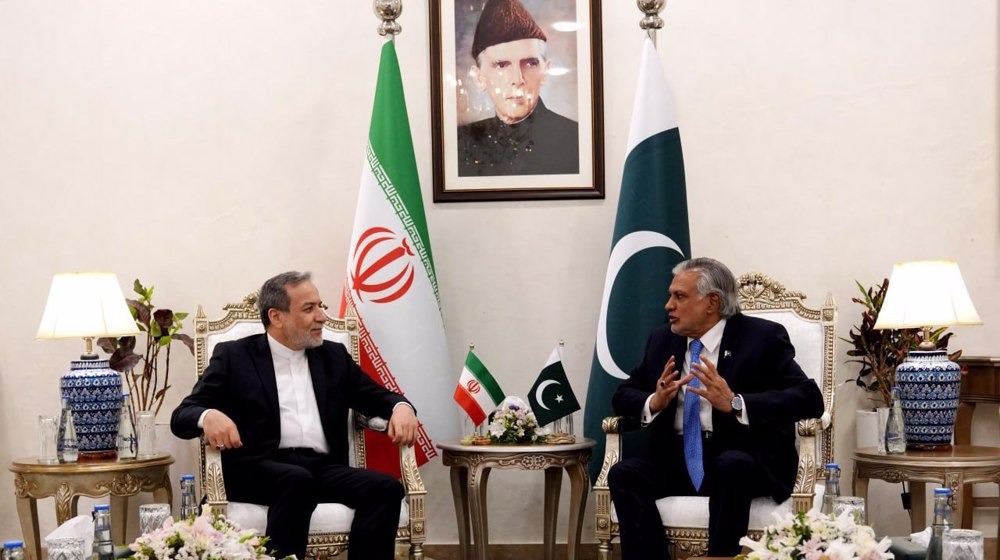
In a key meeting with Deputy Prime Minister and Foreign Minister Senator Ishaq Dar, both leaders exchanged views on the evolving situation in South Asia, particularly in the wake of the April 22 Pahalgam incident, and ongoing US-Iran negotiations. They agreed that complex regional challenges could best be addressed through dialogue and diplomacy.
According to a statement by the Foreign Office, the two ministers reaffirmed their shared commitment to peace and stability and expressed a strong desire to deepen bilateral cooperation in trade, energy, and connectivity. They also emphasized maintaining high-level exchanges to keep the momentum in Pakistan-Iran relations.
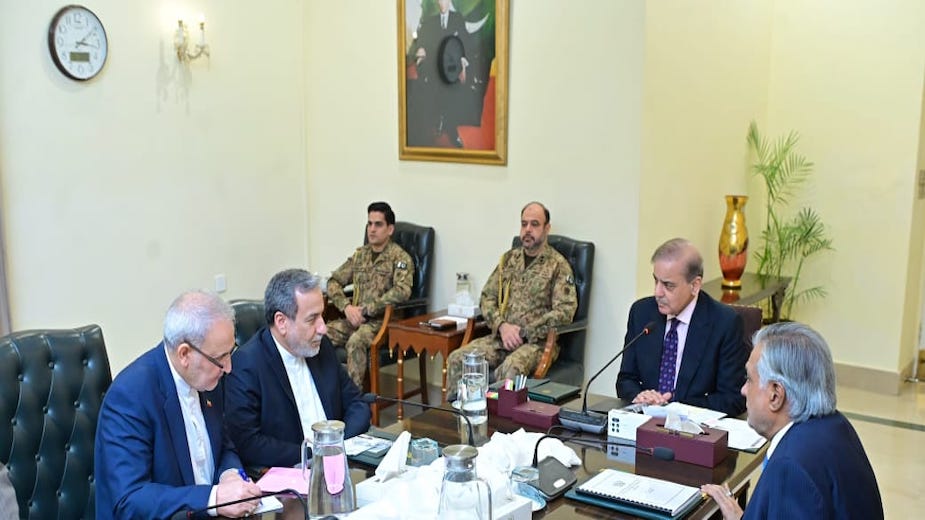
Later, Foreign Minister Araghchi called on Prime Minister Muhammad Shehbaz Sharif and conveyed condolences from the Iranian leadership over the recent loss of lives in the tragic Bandar Abbas explosion. The prime minister offered prayers for the victims and wished a speedy recovery for the injured.
During the meeting, PM Shehbaz expressed grave concern over the heightened tensions in South Asia triggered by India’s provocative posture following the Pahalgam incident. He categorically rejected New Delhi’s attempts to implicate Pakistan without presenting any evidence and reiterated Islamabad’s offer for a transparent, neutral, and internationally credible investigation.
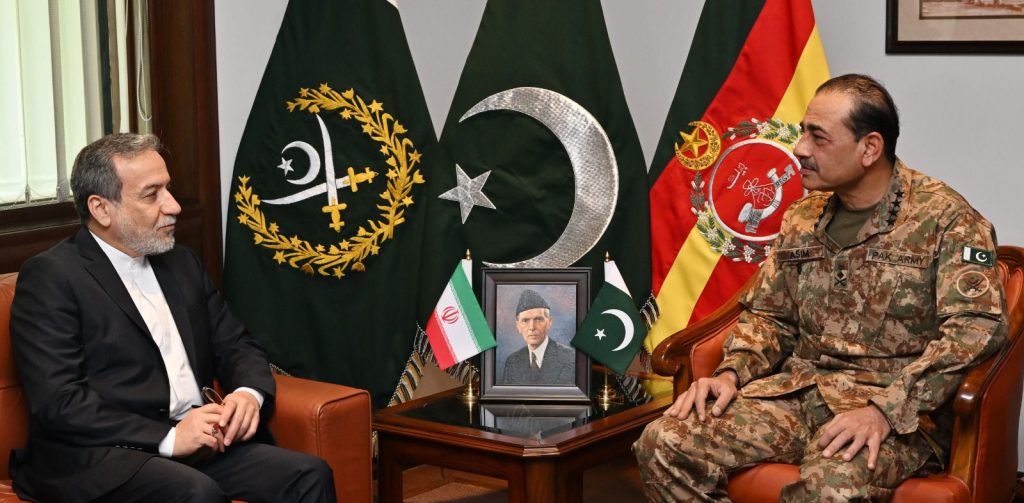
He warned that India’s weaponization of the Indus Waters Treaty was a “red line” for Pakistan and emphasized that peace and stability in South Asia could not be achieved without resolving the Jammu and Kashmir dispute.
The prime minister highlighted the importance of Pakistan-Iran relations and recalled his recent interactions with Iranian President Masoud Pezeshkian. He stressed the need to enhance collaboration in trade, energy, border management, and regional connectivity. He also conveyed his regards to Supreme Leader Ayatollah Ali Khamenei and welcomed Iran’s invitation for an official visit to Tehran later this year.
Foreign Minister Araghchi reaffirmed Iran’s commitment to strengthening ties with Pakistan and promoting peace in the region. He reiterated Iran’s understanding of Pakistan’s position and urged restraint from all sides to avoid further escalation.
In a separate meeting with President Asif Ali Zardari at Aiwan-e-Sadr, the two leaders discussed bilateral ties and regional developments, including the Pahalgam incident and the humanitarian crisis in Gaza.
President Zardari emphasized the historical and brotherly nature of Pakistan-Iran relations and expressed concern over India’s aggressive behavior, which he said threatened regional peace. He welcomed Iran’s efforts to promote diplomacy and reiterated Pakistan’s commitment to peaceful dialogue.
The two leaders also strongly condemned the ongoing Israeli aggression in Gaza and the West Bank, calling for an immediate end to human rights violations.
Foreign Minister Araghchi assured that Iran would continue to coordinate closely with Pakistan on regional issues, including Afghanistan, and conveyed President Pezeshkian’s best wishes to President Zardari.
In addition, Iranian Foreign Minister Seyed Abbas Araghchi met with Chief of Army Staff (COAS) General Syed Asim Munir at General Headquarters (GHQ) for wide-ranging talks focused on regional security and bilateral cooperation.
According to a statement issued by the Inter-Services Public Relations (ISPR), the two sides held constructive discussions on the evolving geo-strategic landscape, particularly the shared security challenges faced by both Pakistan and Iran.
The meeting also reviewed the existing border security mechanism, with an emphasis on enhancing coordination to ensure peace and stability along the Pak-Iran frontier.
General Munir reaffirmed the deep-rooted ties between the two countries, highlighting their historical, cultural, and religious bonds. Both sides expressed commitment to maintaining regular engagement aimed at strengthening bilateral cooperation and contributing positively to regional stability.
Foreign Minister Araghchi appreciated Pakistan’s role in promoting peace and stability across the region and emphasized continued collaboration between the two neighboring nations.
The visit is seen as part of Pakistan’s broader diplomatic outreach amid rising tensions in South Asia, with Tehran reaffirming its support for de-escalation and dialogue.

